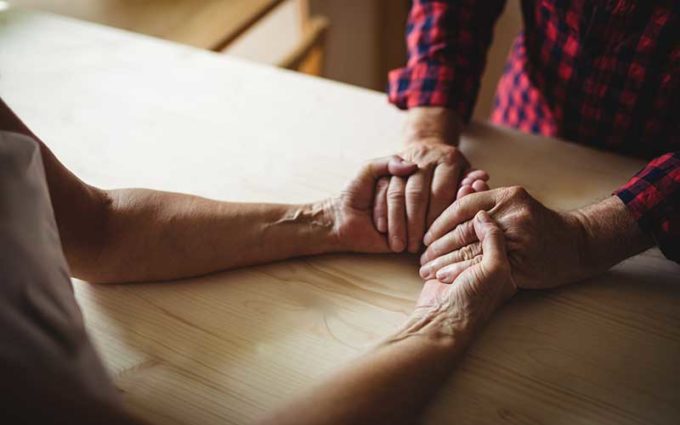How to Deal With Grief and Loss

Grief is much more than a natural reaction to losing a loved one. People also experience grief when they lose a pet or feel remorseful over a choice they were forced to make. A person may even experience grief when they retire after working all their life.
The truth is that grief is a complicated condition that you can experience at any point in life. There are times where this grief may feel insurmountable, but there are ways you can deal with it. The first step in dealing with grief is by first understanding what it is.
What Is Grief?
Grief is an emotion that results in intense emotional and cognitive reactions. And, as previously mentioned, these reactions can be caused by many events, including the loss of a loved one or pet, retirement, divorce, changes in health, and more. The underlying similarity between all of these causes is loss, whether that’s the loss of a job, loss of a loved one, or the loss of good health.
When it comes to losing a loved one, research even suggests that we have specialized neurons that do nothing but “remember” and monitor people who we depend on for emotional satisfaction. After losing a loved one, these neurons are unable to stop remembering and monitoring loved ones. It is only over time that these brain cells eventually realize that the absent person no longer exists in a physical sense.
In addition to standard grief, there’s also a chronic condition called complicated grief.
Complicated Grief
When a person doesn’t cycle through the five stages of grief: denial, anger, bargaining, depression, and acceptance, they may start to develop a condition called complicated grief, or persistent bereavement disorder. Signs of complicated grief include but are not limited to:
- Constant Rumination: Frequently thinking about how, when, where and/or why a loved one passed, or obsessively reminiscing about a loved one.
- Avoidance Behaviors: This type of behavior includes refusing to visit a loved one’s gravesite or rebuffing requests to help relatives get a deceased loved one’s home ready for selling.
- Inability to Control Emotions: A person struggling with complicated grief may laugh, cry, or angrily lash out at inappropriate moments.
- Newfound Addiction: Developing an addiction to drugs or alcohol to numb intense emotions.
- Hoarding: Refusing to throw away old or broken items once owned by the loved one.
Complicated grief also shares some symptoms with depression, including self-isolation, inability to stick to a normal routine, and feelings of hopelessness, guilt, or self-hatred. If you are experiencing grief, you could benefit from counseling. However, if you’re experiencing complicated grief, it’s recommended that you seek a licensed doctor if your grief has drastically reduced your quality of life or if you have thoughts of suicide. Remember, you don’t have to go through this alone.
The 5 Stages of Grief
Earlier we mentioned the five stages of grief: denial, anger, bargaining, depression, and acceptance. In order to fully understand grief, you also need to understand the entire grieving process.
1. Denial
The first stage, denial, is just how it sounds. You simply cannot believe a loved one has passed. You think it could be a bad dream that you’ll wake up from soon. Something inside you won’t let you accept the fact that a loved one has passed.
2. Anger
After you come to the understanding that your loved one has passed, you may feel anger. This anger could be directed towards yourself, your family members, God, or even life itself. At times, you may ask yourself: Why did my loved one deserve to die? Why didn’t I get to spend more time with them? At times, you may even lash out without being provoked.
3. Bargaining
Once you overcome your anger, you may start to think that the entire situation could be reversed or improved somehow. Maybe if you promise a higher power you won’t engage in bad habits, they will make you feel better and somehow change your circumstances. The bargaining phase is half desperation and half viewing your situation through rose-colored glasses.
4. Depression
Eventually, the illusion of bargaining fades, which is then replaced with depression. Now you feel empty and hopeless as the reality of your loved one’s passing can no longer be avoided. No amount of bargaining will change this, being angry won’t change anything, and pretending that the situation never even happened isn’t going to change reality.
During this stage, you may feel overwhelming fatigue, a lack of interest in your everyday activities, a tendency to self-isolate. You may ruminate on past conversations with your loved one, and feel pain or regret at some of the words you may have spoken to them.
After experiencing loss, it’s important to remember that there are ways to cope with these feelings, and some of these feelings may even be temporary. Instead of thinking about the past and what you may or may not regret from that past, think about how to move forward. What would your loved one want you to experience? Are there ways you can honor their legacy now and in the future?
Some people find creative ways to deal with loss and newfound depression, including planting memorial seeds, donating to or starting a charity in honor of their loved one, and even raising and releasing butterflies. You may also want to join a support group and visit a counselor—most funeral homes provide grief support services.
5. Acceptance
The emotional pain of losing a loved one will never vanish, but once you reach the acceptance phase, you don’t deny the reality that they are truly gone. You also don’t struggle with the compulsion to find a way to change what happened to you. While you still experience twinges of sadness, guilt, or regret, you don’t dwell on them or let them control your life.
Additionally, there are some situations where a person may not even experience all five stages of grief. There is also another reaction that you may experience after the loss of a loved one: reconciliation. In this process, you acknowledge the emotional pain of losing a loved one, search for tolerable methods of adjusting to the loss, and incorporate special characteristics of the loved one into your self-identity.
Coping With Grief & Loss
Coping with grief and loss is an incredibly personal experience. If you are religious, you may find support at your church or other place of worship. Or, you may find comfort through your friends and family.
Additional ways you can cope with grief and loss include:
- Keeping a Journal
- Starting a New Hobby
- Reading Self-Help Books
- Talking to a Grief Counselor
- Joining an Organization or Support Group
- Cooking Your Loved One’s Favorite Dishes
- Meditating
- Volunteering
Find Grief Support Today
Losing a loved one is never easy. That’s why Wujek-Calcaterra & Sons is always here for you. We help families in Michigan cope with the loss of a loved one by providing individualized memorial services and grief support. Contact us today to schedule a counseling session with Dr. John D. Canine or to get help planning your loved one’s memorial.







